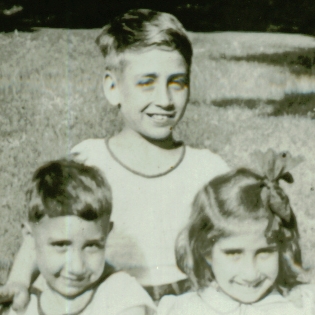 I want to share a photo of my father. In the photo, he is about eight or nine years old, and he’s kneeling behind his younger twin siblings. Except for a photo taken of him as an infant, it’s the only childhood photo I’ve ever seen of my father.
I want to share a photo of my father. In the photo, he is about eight or nine years old, and he’s kneeling behind his younger twin siblings. Except for a photo taken of him as an infant, it’s the only childhood photo I’ve ever seen of my father.
I’ve been haunted by this picture for many years. Once I started realizing that my father had Asperger’s, I finally realized why. My father is doing something with his eyes in this photograph that makes me hurt inside:
He’s looking at the camera, and not looking at the camera, at the same time. He looks like he’s in pain and trying not to show it. His siblings are looking directly at the camera, while my father looks almost as though he’s between worlds.
[full-size, uncropped photo here]
He almost always looked that way, like someone trying desperately hard to plow ahead while the world pressed in on him with a bewildering amount of intensity. I don’t know that it’s possible to forgive the things he did when he was alive, but I understand him now. He’s no longer my frightening and tyrannical father. He was someone in constant pain. He felt completely alone and vulnerable, all the time, every day, for his entire life, and he had no words for it, and he had no one to talk with about it, and he had no community, and he had no support. He was the man of the house—that was the beginning and the end of everything—and he looked straight ahead into the world and tried not to flinch.
It didn’t work. His pain came out in soul-crushing ways.
I complain a lot about the ways that the medical profession pathologizes us, but we have a big advantage over my father. We have one another. And the children coming up will at least have the words to describe who they are and what they feel, even if those words miss the mark. It’s a beginning. It’s something to work with.
It’s more than my father had.
Rachel Cohen-Rottenberg blogs at Journeys with Autism. A Haunting Photo appears here under the terms of this Creative Commons License.
Rachel Cohen-Rottenberg’s memoir is The Uncharted Path: My Journey with Late-Diagnosed Autism.
Rachel Cohen-Rottenberg on 12/17/10 in featured, The Unconscious | 2 Comments | Read More
Comments (2)


No small achievement for you (or anyone) to be able to write that, Rachel. It reminds me too of this passage in a published letter from Michael Ventura which has long haunted me in relation to people I know and have known.
“More kid stories.
“Judith (My god, I just realized she’s a therapist, too! I promise you I’m not selecting systematically.)—anyway, Judith is a cold, rigid woman, whose major passion is to be conventional. That’s not as contradictory as it sounds, for Judith goes about being conventional and imposing the conventional on those around her with a single-mindedness that can only be called passion. It’s the only passion she displays freely. Yet this story is told in her family:
“When Judith was very little, not two, her mother proudly had her eating out of a child-sized set of quality glass. Bowls, saucers, cups, that sort of thing—an expensive set. Little Judith took to some strange behavior: when she’d finish eating out of one of the bowls or drinking out of one of the cups, she’d throw the thing with all her might and break it. Her mother was furious and finally threatened that if it happened one more time Judith would never have her own set of nice things again. Later that day the little girl methodically broke every cup, bowl, and dish in the set.
“I hear Judith’s daimon saying, “They are too strong for me, the crushing-of-spirit in this family is too strong, I cannot stand up to it, I’m going to lose, but I’m going to lose this way, with a gesture that they won’t forget. I myself would forget this loss over the years, that’s how complete their victory would be if I didn’t leave them this gesture that they wil not forget. They’ll keep telling it to me, it will be a ‘family story.’ If I get married, they’ll tell my husband, if I have children they’ll tell my children. And perhaps one of them—or even me, maybe, when I’m old—will see that this, which is so ‘unlike me,’ was the last time I was me.
“Wouldn’t such an explanation fit many a family story that one hears, not necessarily in the consulting room but over dinner or when being shown an album of photographs?
— from We’ve Had A Hundred Years Of Psychotherapy—And The World’s Getting Worse
Yes, these “family stories” can be so destructive, but ultimately, very empowering, because they keep alive what happened rather than consigning it to the realm of denial.
In my family, we had such a story, all of which was regularly summoned from the realms of darkness by my father looking at a photo of me when I was a flower girl at the age of 4 and saying “You were such a brat that day.” It was a day that I had started screaming every time the wedding photographer had tried to take my picture, and I only stopped after my father took me to the basement and beat me. It was my first and last childhood meltdown. If he had not kept recalling that story even into my adulthood, I might never have taken back my power over the true telling of what really had happened and what it meant for my life.